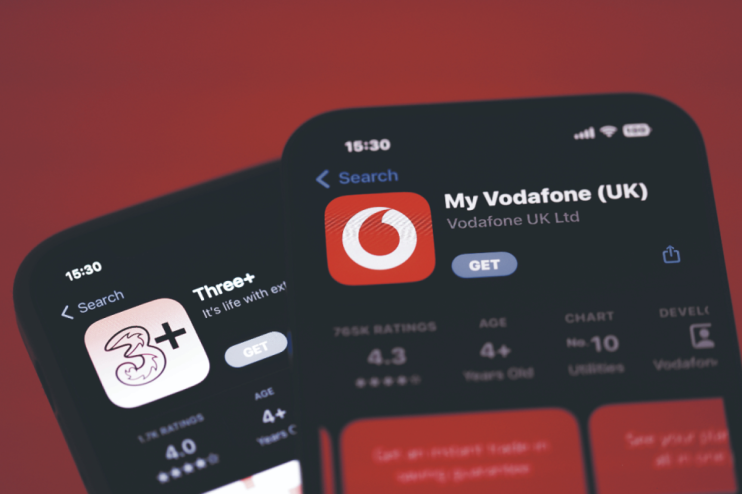Analysts see ‘path to approval’ for Vodafone and Three deal

Although Britain’s competition watchdog has raised fresh concerns over the proposed £15bn tie-up between Vodafone and Three’s UK operations, analysts have suggested the findings of the latest probe are more positive than expected.
In its provisional findings, the Competition and Markets Authority (CMA) flagged potential price increases for millions of mobile customers and warned of reduced services, such as smaller data packages.
The watchdog also expressed “particular concerns” that the merger could disproportionately impact vulnerable customers, who may face higher bills or be forced to pay for network improvements “they do not value.”
Vodafone’s chief executive Margherita Della Valle, rejected these concerns, saying: “We do not agree that prices will go up. From the outset, we have been very clear that the merger will not affect our pricing strategy and that all social tariffs will continue to protect the vulnerable.”
She also dismissed fears that the deal would negatively affect the wholesale market, as 90 per cent of UK MVNOs rely on either VMO2 or BT/EE as their wholesale provider.
“A combined stronger network would significantly boost competition in the wholesale market by giving MVNOs more choice and better quality from three scaled wholesale network providers,” Della Valle added.
Vodafone and Three first announced the merger last summer, touting it as a game-changer that would improve competition and service quality and inject £11bn in investment to roll out 5G networks across the UK.
The merger received clearance from the British government in May, which dismissed national security concerns tied to CK Hutchison, the Hong Kong-based owner of Three.
However, the CMA’s green light is still pending, with regulators scrutinising whether the merger, which would reduce the number of major UK operators from four to three, might hurt competition.
The CMA also fears it could make it harder for smaller mobile operators such as Sky Mobile and Lyca Mobile to offer customers competitive deals and that the merged company might be less inclined to participate in network-sharing agreements, which could hinder BT’s mobile network rollout.
Analysts see glimmer of hope
Despite the CMA’s concerns, some industry analysts are now more optimistic about the deal’s prospects.
Paolo Pescatore, media analyst and founder of PP Foresight, said the CMA’s findings “signal a potential pathway, importantly through behavioural rather than any structural remedies.”
While the focus remains on potential price increases, he said, “it’s pence per month and doesn’t outweigh the benefits of building the network the country deserves.”
Matthew Howett, founder and chief executive of Assembly Research, added that with the CMA ruling out structural remedies, such as forcing the sale of assets, “for the first time, we can see a pathway for the deal to complete.”
At the start of August, the CMA extended its final deadline to complete the probe and publish its findings until December 7 due to the inquiry’s complexity and “very wide scope”.
Head of telecoms at Enders Analysis, Karen Egan, said that the CMA’s provisional findings are “a lot more positive than first appears,” pointing out that the expected price rise would amount to just 28p per subscriber per month. She said Enders now expects the conclusion to be a “positive one”.
“Vodafone and Three should be encouraged by the tone of the CMA’s report, which appears more open to the merger than I was expecting,” said Kester Mann, analyst and director of consumer and connectivity at CCS Insight.
“The main knockback to the merging parties is that the CMA considers claims of superior network quality post integration to be ‘overstated’,” said Mann.
Vodafone offers legally-binding pledge
In a move to sway the watchdog, Vodafone has made a legally binding commitment to invest £11bn in digital infrastructure, breaking down its spending by geographic area and spectrum allocation.
“We’re not only committing to spend the money, we’re committing on where to spend it,” said Ahmed Essam, former boss of Vodafone UK, now the executive chairman of Vodafone Germany and chief of European Markets.
The investment will cover cities, villages and rural areas across all four nations of the UK.
Essam, who revealed that the CMA questioned whether Vodafone would fulfil its £11bn investment after the merger, said the legally-binding pledge would be overseen by Ofcom and subject to “massive penalties” if unmet.
“This shows our commitment towards the merger,” Essam told City A.M., adding that it will “end up with the picture that we painted early on about delivering the biggest 5G standalone network in the UK.”
As previously announced, the telecoms giant has also renewed its network-sharing deal with Virgin Media O2, which Essam said ensures a “level playing field” across the three major players— the Vodafone-Three merged entity, BT/EE and Virgin Media O2.
Three UK’s boss Robert Finnegan recently described his company’s financial performance as “unsustainable” without the merger.
He has also warned of job cuts if the deal goes through, with Unite The Union estimating that 1,600 roles could be at risk. The union has slammed the merger as “reckless”.
Naturally, some industry rivals are opposed to the deal. BT has lashed out against it in a 40-page document, saying the proposed terms will give the merged company a “disproportionate share of capacity and spectrum” and will hurt competition and deter investment in the UK.